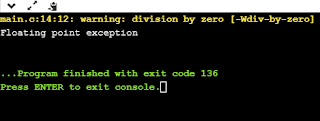Programming Errors In C Language
Errors
are the problems or the faults that occur in the program, which makes the
behavior of the program abnormal, and experienced developers can also make
these faults.
Programming errors are also known as the bugs or faults, and the
process of removing these bugs is known as debugging.
These
errors are detected either during the time of compilation or execution. Thus,
the errors must be removed from the program for the successful execution of the
program.
 |
Fig: Programming Error In C Langauge |
There are mainly five types of errors exist in C programming:
- Syntax
error
- Run-time
error
- Linker
error
- Logical
error
- Semantic
error
1.Syntax error
Syntax
errors are also known as the compilation errors as they occurred at the
compilation time, or we can say that the syntax errors are thrown by the
compilers. These errors are mainly occurred due to the mistakes while typing or
do not follow the syntax of the specified programming language.
Program
#include <stdio.h>
int main()
{
a = 10;
Output:

Fig: Syntax Error
Syntax
errors are also known as the compilation errors as they occurred at the
compilation time, or we can say that the syntax errors are thrown by the
compilers. These errors are mainly occurred due to the mistakes while typing or
do not follow the syntax of the specified programming language.
Program
#include <stdio.h>
int main()
{
a = 10;
printf("The value of a is : %d", a);
return 0;
}
Output:
 |
Fig: Syntax Error |
2.Run-time error
Sometimes
the errors exist during the execution-time even after the successful
compilation known as run-time errors. When the program is running, and it is
not able to perform the operation is the main cause of the run-time error. The
division by zero is the common example of the run-time error.
Program
#include <stdio.h>
Output:

Fig: Run-time Error
Sometimes
the errors exist during the execution-time even after the successful
compilation known as run-time errors. When the program is running, and it is
not able to perform the operation is the main cause of the run-time error. The
division by zero is the common example of the run-time error.
Program
#include <stdio.h>
int main()
{
int a=2;
int b=2/0;
printf("The value of b is : %d", b);
return 0;
}
Output:
 |
Fig: Run-time Error |
3.Linker error
Linker errors are mainly generated when the executable file of the program is not created. This can be happened either due to the wrong function prototyping or usage of the wrong header file.
4.Logical error
The
logical error is an error that leads to an undesired output. These errors
produce the incorrect output, but they are error-free, known as logical errors.
Program
#include <stdio.h>
Output:

Fig: Logical Error In C Language
The
logical error is an error that leads to an undesired output. These errors
produce the incorrect output, but they are error-free, known as logical errors.
Program
#include <stdio.h>
int main()
{
int sum=0; // variable initialization
int k=1;
for(int i=1;i<=10;i++); // logical error, as we put the semicolon after loop
{
sum=sum+k;
k++;
}
printf("The value of sum is %d", sum);
return 0;
}
Output:
 |
Fig: Logical Error In C Language |
5.Semantic error
Semantic
errors are the errors that occurred when the statements are not understandable
by the compiler.
The following can be
the cases for the semantic error:
- Use
of a un-initialized variable.
int i;
i=i+2;
- Type
compatibility
int b = "dwivedicyberdairy";
- Errors
in expressions
int a, b, c;
a+b = c;
- Array
index out of bound
int a[10];
a[10] = 34;
Program
#include <stdio.h>
Output:

Fig: Semantic Error In C Language
Semantic
errors are the errors that occurred when the statements are not understandable
by the compiler.
The following can be the cases for the semantic error:
- Use
of a un-initialized variable.
int i;
i=i+2; - Type
compatibility
int b = "dwivedicyberdairy"; - Errors
in expressions
int a, b, c;
a+b = c; - Array
index out of bound
int a[10];
a[10] = 34;
Program
#include <stdio.h>
int main()
{
int a,b,c;
a=2;
b=3;
c=1;
a+b=c; // semantic error
return 0;
}
Output:
 |
Fig: Semantic Error In C Language |







No comments:
Post a Comment